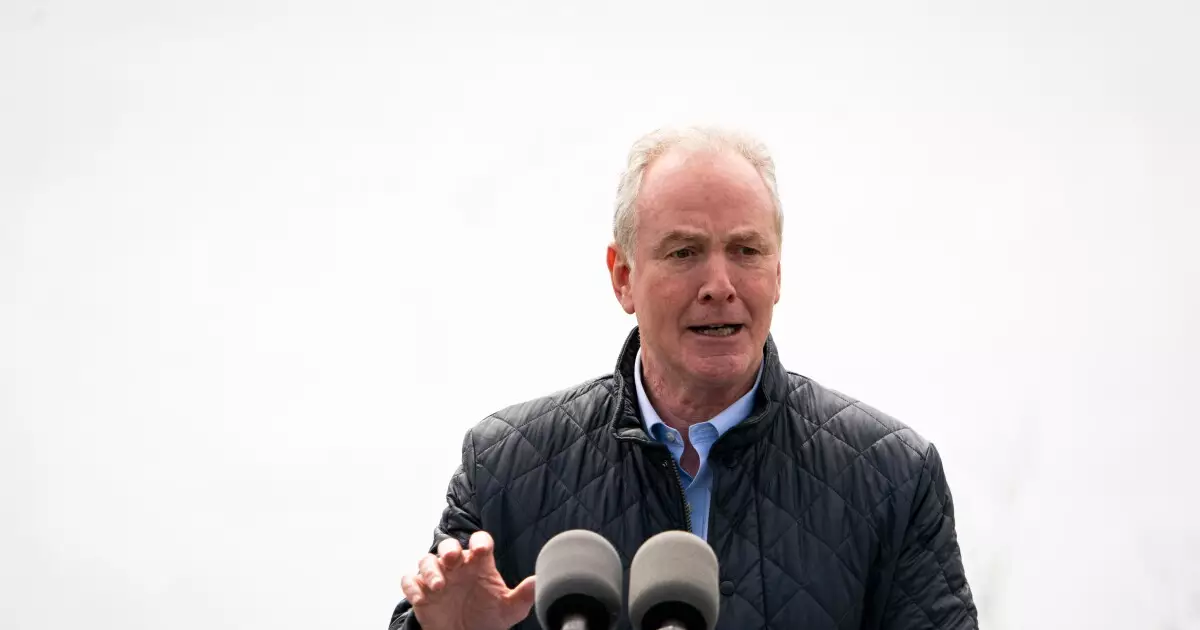In the intricate realm of U.S. governance, the recent legislative maneuvers in Congress not only highlight the challenges that lawmakers face but also reveal the nature of American politics—one steeped in negotiation, conflict, and contentious victories. As Congress concluded its session with a continuing resolution (CR) to temporarily fund the government until mid-March, it opened a Pandora’s box of issues, most notably the ongoing debate surrounding the debt ceiling and the implications of partisan divides.
The CR, while a necessary measure to keep government operations running, is merely a stopgap solution. Approving funding through March 14 underlines the urgency that permeates the Capitol, but it does little in addressing the long-term fiscal concerns that Congress will need to tackle in the near future. Lawmakers like Senator Chris Van Hollen celebrated the CR for including 100% funding for the replacement of the Key Bridge, which suffered damage earlier this year. However, this success story exemplifies a broader tension within Congress: How do states responsibly utilize federal funds while maintaining a fiscal integrity that resonates across party lines?
The Key Bridge funding, although essential for Maryland, sparked controversy regarding the use of taxpayer dollars to address infrastructure failures that have long-term implications. Critics argue that such expenditures should not rely heavily on federal support, as they can set a concerning precedent for state accountability. This bridge saga illustrates a deeper issue: the balancing act between state needs and federal fiscal responsibility.
District of Columbia’s Gains
Moreover, the legislation proved particularly fruitful for Washington D.C. and its aim for increased autonomy. The successful transfer of the RFK Stadium site from federal oversight is significant for D.C. residents who have long advocated for self-determination. Non-voting Congresswoman Eleanor Holmes Norton hailed the transfer as a victory, but what remains is the question of whether incidences like this indicate a true shift in governance or merely a token gesture ahead of more pressing issues.
Additionally, the CR allocated $90 million for the upcoming presidential inauguration, a decision showcasing the city’s unique obligations during a political transition. The fact that local officials had to present their case before Congress signifies the fragility of intergovernmental fiscal relations. It begs the question: Should cities constantly fight for funding, or can they expect unencumbered support for such nationwide events?
The Debt Ceiling Dilemma
The specter of the debt ceiling looms larger than ever, as disagreements between political titans emerge. The ultimatum issued by former President Trump—linking the CR to debt ceiling negotiations—has added another layer of complexity to an already packed agenda. Proponents of responsible fiscal policy fear the ramifications of this contentious debate on the nation’s economic stability. Indeed, raising the debt ceiling is inextricably tied to questions about the United States’ creditworthiness and its ability to honor debts, a situation sure to stir unease within financial markets.
The rift among House Republicans illustrates the fractures within the party. Trust and alignment are being tested, especially as calls for fiscal conservatism clash with the demands of party loyalty. The maneuvers of Trump and his supporters against members who push back—such as the 38 House Republicans resisting the plan—augur a significant internal struggle that could dramatically alter House leadership dynamics. Such pivotal moments challenge Speaker Mike Johnson’s authority and could mark a turning point for party unity as the 119th Congress navigates complicated waters ahead.
Looking forward, the fate of recent tax legislation looms large over Congress. The looming expiration of provisions from the Tax Cuts and Jobs Act presents both a challenge and an opportunity for lawmakers. With the Ways and Means Committee poised at the forefront of impending tax discussions, the insistence from Chairman Jason Smith on maintaining the status quo reflects a strategy many perceive as essential for economic continuity. However, whether this sustained support can effectively coalesce the various factions within Congress will only become clearer in the months to come.
Ultimately, the ongoing saga in Washington is one of managing disparate interests while seeking compromises that appease both constituents and party ideologies. As the stakes rise with looming deadlines and financial concerns, the capacity for leaders to cultivate cooperation will be severely tested. This chapter of American politics is a reminder that beyond the negotiation tables lies the groundwork for significant policy shifts that may either stabilize or destabilize the governance landscape in the years to come.

